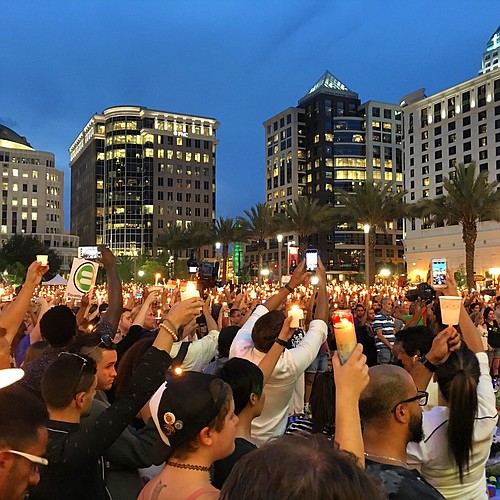- November 23, 2024
-
-
Loading

Loading

It was 9:06 p.m. I walked out of the News 13 Orlando newsroom, through the hallways, across the catwalk and got to my car in the desolate parking garage in downtown Orlando.
I sat down in the driver’s seat and turned the car on as the music hummed in the background.
It had been about 17 hours since chaos erupted at Pulse, the gay nightclub located just outside downtown Orlando — and only about 2 miles from both my house and the newsroom. I pass Pulse on my way to work every day. I was next to it Saturday morning because there’s a Dunkin’ Donuts right across the road, and we went there for coffee before going out to play golf. It actually even came up in the car during discussion because our friend visiting from Tampa hadn’t heard of it. That felt like a lifetime ago.
In my car in the parking garage, I leaned back. I started to cry. And kept crying. I really didn’t know what else to do.
I fell asleep pretty late Saturday night, and then I happened to wake up around 4:30 a.m. A movie was playing on the TV in my room.
My phone was sitting next to me, and I tapped on the Twitter icon. The Orlando Police Department’s Twitter account said there was a shooting at Pulse. Multiple victims. People were urged to stay away from the area.
I report on police activity all the time. It’s my job. But something didn’t seem right about this one. I retweeted the information from our work account, branded it as breaking news, and then went back to OPD’s account.
As it would turn out, for the time being, updates were only going to come from Twitter. The media briefing was pushed back.
Finally, the word came from Orlando police: The shooting was a “mass casualty situation.”
Multiple people dead turned into 20 fatalities. That quickly jumped to 49 (not including the suspected gunman). Fifty-three people were taken to nearby hospitals.
The deadliest mass shooting in the history of the United States was unfolding in real time in front of my eyes.
I got into work around 8 a.m. It was Sunday, which means it’s usually pretty quiet in the newsroom. But it was an all-hands-on-deck situation: Every employee of News 13 was called in. Reporters and photographers from our sister station in Tampa Bay, Bay News 9, also sent crews up the I-4 corridor.
The newsroom was buzzing. Most of us were in disbelief, but we had a job to do. We had news to report. And new information was coming in quicker than we could disseminate it.
We were getting requests from international media outlets to provide insight on the shooting.
At one point, I had a missed call, a voice mail and a text message from a news outlet in Ireland asking me to do a phone interview. Australia called us.
I knew I wanted to be a journalist since I was about 5 years old. I would pretend being an ESPN reporter and would sign off reporting live from the kitchen or the driveway.
I wanted to tell people’s stories in the community I worked in — stories of tragedy and triumph. Stories that others can relate to. That’s what drove me into the industry.
Unfortunately, covering mass shootings and terror attacks is also part of the job. But I would be lying if I said it was easy to keep on the journalist mask for 17 hours until I could get into my car and be a human again.
Thousands attended a candlelight vigil on the green of the Dr. Phillips Center for Performing Arts on Monday night in downtown Orlando.
It was just before 7 p.m. that the 49th victim was identified.
There were representatives from various organizations and different political arenas from across the country and world. There were people who lost friends and family members in the Pulse shooting. There was a lot of media, and there were also people who just wanted to be part of the grieving process.
“We embrace diversity and equality,” Orlando Mayor Buddy Dyer told the crowd in front of him. “(The city of Orlando) is a joyful melting pot of different cultures.”
After a bunch of speakers, the crowd raised candles to light up the sky as the sun set just a day after the city’s darkest hours.
My throat continued to swell up as I looked at people milling around, hugging each other, crying with each other, laughing with each other.
One man was standing by himself as the crowd of thousands began to file out. He stared at the stage, at the rainbow lighting on the large Dr. Phillips Center building. He wiped away the tears from his red eyes. Others just lay on the grass and looked at the sky with the candles lit on the ground next to them.
“Hate will not define us,” Dyer said. “And hate will not defeat us, because we are one Orlando.”
It was a powerful yet delicate tribute to the city known as the City Beautiful.